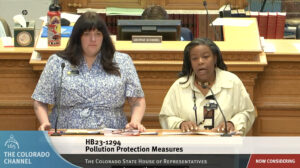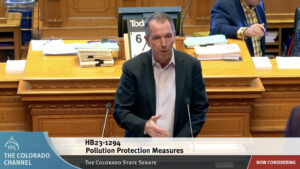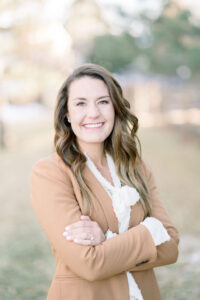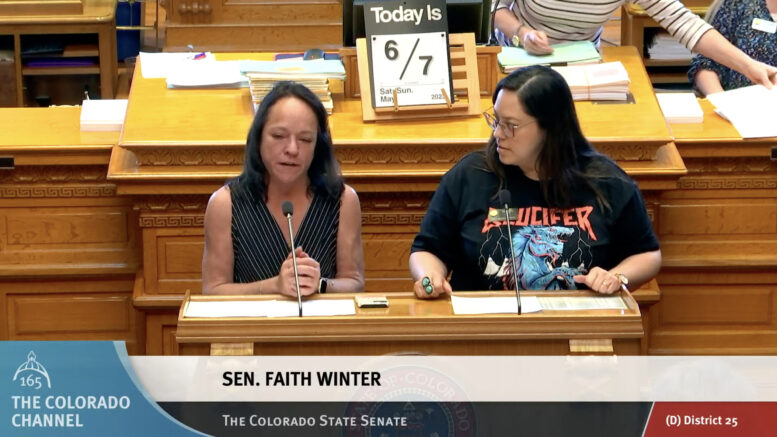An air-quality permitting reform bill originally criticized as a “backdoor ban on oil and gas” underwent a third major set of revisions during a rare Sunday legislative session, and business leaders are breathing a sigh of relief about the impact the current version may have on industry.
House Bill 1294, introduced in mid-April with less than a month left in the 2023 legislative session, sought at first to ramp up permitting requirements on what are considered minor sources of air pollution and to make state government investigate more complaints in this area. It came shortly after Gov. Jared Polis directed two state agencies to enact rules to cut ozone-producing nitrous oxide emissions from oil and gas wells, and the more significant changes it proposed ran into opposition from energy firms, business groups and the Polis administration.
Sponsoring Democratic Reps. Jennifer Bacon of Denver and Jenny Willford of Northglenn first scaled back the most serious permitting upgrades to ideas to be studied by an interim legislative committee but still launched rulemakings to push outcomes like electric drilling equipment. Then, with the Colorado Department of Public Health and Environment saying the investigatory and rule requirements would necessitate $31 million in funding, they removed timelines for investigations, deleted requirements on new emissions standards and eliminated a provision wrapping minor sources of emissions into regulations of the air-pollutant control program.

Colorado state Reps. Jenny Willford and Jennifer Bacon speak on April 29 about their bill to improve Colorado’s air-quality permitting process.
Air-quality permitting amendments didn’t quiet opposition
Even with the multitude of changes, though, both environmental and business advocates packed the Senate Transportation and Energy Committee late Thursday. Groups such as Earthworks and CoPIRG said that the bill would push state government into investigative action it sometimes won’t take now and would allow the committee to write and introduce bills to take needed steps to clean up the air.
But industry defenders like Davis, Graham & Stubbs partner John Jacus, Colorado Chamber of Commerce board chairman, said that the legislative committee would interfere with air-cleaning reforms already underway in state government and that the bill would require state agencies to treat evidence submitted by air-pollution complainants as “immutable facts” in investigations. And Colorado Oil and Gas Conservation Commission Director Julie Murphy balked at the bill defining “cumulative impacts” to be considered when weighing the issuance of permits because her agency is working on developing that definition now with stakeholders.
On the 119th day of the 120-day legislative session Sunday, co-sponsoring Democratic Sens. Faith Winter of Westminster and Julie Gonzales of Denver added two major amendments that sought to mute the substantial opposition that remained on HB 1294.
What the changes do

Colorado Senate Minority Leader Paul Lundeen speaks Sunday about changers to House Bill 1294.
One removes the ability for residents claiming injury from pollution to file lawsuits and request that the judge substitute the Colorado Air Quality Control Commission as the complaining party and strikes the ability of the interim committee to introduce bills directly. It also specifies that CDPHE does not have to accept evidence in complaints that is, on its face, falsified, and it allows the department to dismiss complaints that are falsified as well.
The second amendment removes the definition of “cumulative impacts” that HB 1294 sought to require CDPHE and COGCC to adopt, and it instead requires there to be a rulemaking with stakeholder input to develop a definition that includes impacts on climate and public health. The new effort, driven by environmental advocates’ frustration that COGCC has not set a timeframe on producing a definition four years after Senate Bill 19-281 required it to do so, mandates a reporting date of April 2024 but leaves room for what goes into the definition.
Senate Minority Leader Paul Lundeen, R-Monument, said after the changes that while he will still vote “no” on the bill, HB 1294 is in much better shape than Thursday, when he called it “an attack on oil and gas, not a bill that deals with the cumulative impacts of the air we breathe.” He and Colorado Chamber senior vice president of governmental affairs Meghan Dollar both said they appreciated the sponsors’ willingness to compromise to move forward a bill that now focuses on having elected leaders discuss ways to reduce ozone pollution rather than putting regulatory changes into place before those discussions take place.
What’s left in air-quality permitting reform bill

Kalt Schwartz is director of American Petroleum Institute Colorado.
As HB 1294 now stands, it has three general tenets: Creation of the interim committee, a required definition of “cumulative impacts” within one year and allowance of citizens to submit evidence to prove pollution levels coming from nearby wells. Kait Schwartz, director of the American Petroleum Institute Colorado, said that the interim committee and definitional rulemaking add to an increasing number of rulemakings that the industry must watch because they affect oil-and-gas companies’ ability to operate, but the bill’s provisions are no longer threatening to the existence of the sector.
“We’re pleased that through the work of our coalition of business and government entities, HB 1294 has gone from an omnibus bill with several problematic provisions, such as a private right of action, to a significantly pared-back version with a focus on rulemaking and an interim committee,” Dollar said.
Final steps in its journey
It’s unknown how environmental groups that pushed Bacon and Willford to introduce the bill will react to the latest changes, particularly after a theme emerged over two committee hearings that the existing complaint process in CDPHE is broken and needs legislative intercession. HB 1294 still must receive final Senate approval on the final day of the session Monday, then it must go back to the House for concurrence with the changes.
But Winter said after making the changes Saturday that HB 1294 still pushes a conversation that had no force of legislative action to continue before the bill was introduced. It’s likely to lead to specific suggestions for ways to improve the air-quality-permitting system in a way that boosts the quality of Colorado’s air, and that’s always been the big-picture aim of the bill, she said.
“Not doing anything wasn’t an option,” Winter said on the Senate floor. “Ultimately, we have to address ozone and air-pollution issues in a way that makes sense, and this bill will go a long way toward that.”
